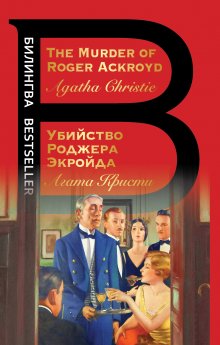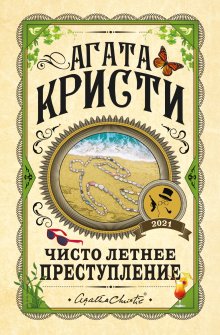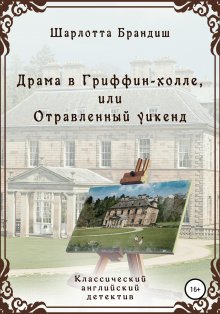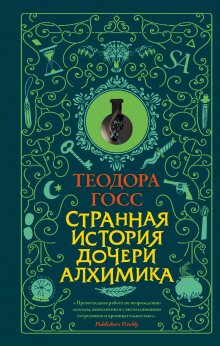Агата Кристи - The Murder of Roger Ackroyd / Убийство Роджера Экройда

Все авторские права соблюдены. Напишите нам, если Вы не согласны.
Описание книги "The Murder of Roger Ackroyd / Убийство Роджера Экройда"
Описание и краткое содержание "The Murder of Roger Ackroyd / Убийство Роджера Экройда" читать бесплатно онлайн.
Агата Кристи
The Murder of Roger Ackroyd / Убийство Роджера Экройда
Copyright © 1926 Agatha Christie Limited.
All rights reserved.
© А. Петухов, перевод на русский язык, 2022
© Издание на русском языке, оформление. ООО «Издательство «Эксмо», 2022
Agatha Christie
The Murder of Roger Ackroyd
Chapter 1
Dr Sheppard at the Breakfast Table
Mrs Ferrars died on the night of the 16th-17th September – a Thursday. I was sent for at eight o’clock on the morning of friday the 17th. There was nothing to be done. She had been dead some hours.
It was just a few minutes after nine when I reached home once more. I opened the front door with my latchkey, and purposely delayed a few moments in the hall, hanging up my hat and the light overcoat that I had deemed a wise precaution against the chill of an early autumn morning. To tell the truth, I was considerably upset and worried. I am not going to pretend that at that moment I foresaw the events of the next few weeks. I emphatically did not do so. But my instinct told me that there were stirring times ahead.
From the dining-room on my left there came the rattle of tea-cups and the short, dry cough of my sister Caroline.
‘Is that you, James?’ she called.
An unnecessary question, since who else could it be? To tell the truth, it was precisely my sister Caroline who was the cause of my few minutes’ delay. The motto of the mongoose family, so Mr Kipling tells us, is: ‘go and find out.’ If Caroline ever adopts a crest, I should certainly suggest a mongoose rampant. one might omit the first part of the motto. Caroline can do any amount of finding out by sitting placidly at home. I don’t know how she manages it, but there it is. I suspect that the servants and the tradesmen constitute her Intelligence corps. When she goes out, it is not to gather in information, but to spread it. At that, too, she is amazingly expert.
It was really this last named trait of hers which was causing me these pangs of indecision. Whatever I told Caroline now concerning the demise of Mrs Ferrars would be common knowledge all over the village within the space of an hour and a half. As a professional man, I naturally aim at discretion. Therefore I have got into the habit of continually withholding all information possible from my sister. She usually finds out just the same, but I have the moral satisfaction of knowing that I am in no way to blame.
Mrs Ferrars’ husband died just over a year ago, and Caroline has constantly asserted, without the least foundation for the assertion, that his wife poisoned him.
She scorns my invariable rejoinder that Mr Ferrars died of acute gastritis, helped on by habitual overindulgence in alcoholic beverages. The symptoms of gastritis and arsenical poisoning are not, I agree, unlike, but Caroline bases her accusation on quite different lines.
‘You’ve only got to look at her,’ I have heard her say.
Mrs Ferrars, though not in her first youth, was a very attractive woman, and her clothes, though simple, always seemed to fit her very well, but all the same, lots of women buy their clothes in Paris, and have not, on that account, necessarily poisoned their husbands.
As I stood hesitating in the hall, with all this passing through my mind, Caroline’s voice came again, with a sharper note in it.
‘What on earth are you doing out there, James? Why don’t you come and get your breakfast?’
‘Just coming, my dear,’ I said hastily. ‘I’ve been hanging up my overcoat.’
‘You could have hung up half a dozen overcoats in this time.’ She was quite right. I could have.
I walked into the dining-room, gave Caroline the accustomed peck on the cheek, and sat down to eggs and bacon. The bacon was rather cold.
‘You’ve had an early call,’ remarked Caroline.
‘Yes,’ I said. ‘King’s Paddock. Mrs Ferrars.’
‘I know,’ said my sister.
‘How did you know?’
‘Annie told me.’
Annie is the house parlourmaid. A nice girl, but an inveterate talker.
There was a pause. I continued to eat eggs and bacon. My sister’s nose, which is long and thin, quivered a little at the tip, as it always does when she is interested or excited over anything.
‘Well?’ she demanded.
‘A sad business. Nothing to be done. Must have died in her sleep.’
‘I know,’ said my sister again. This time I was annoyed.
‘You can’t know,’ I snapped. ‘I didn’t know myself until I got there, and haven’t mentioned it to a soul yet. If that girl Annie knows, she must be a clairvoyant.’
‘It wasn’t Annie who told me. It was the milkman. he had it from the Ferrarses’ cook.’
As I say, there is no need for Caroline to go out to get information. She sits at home and it comes to her.
My sister continued: ‘What did she die of? Heart failure?’
‘Didn’t the milkman tell you that?’ I inquired sarcastically.
Sarcasm is wasted on Caroline. She takes it seriously and answers accordingly.
‘He didn’t know,’ she explained.
After all, Caroline was bound to hear sooner or later. She might as well hear from me.
‘She died of an overdose of veronal. She’s been taking it lately for sleeplessness. Must have taken too much.’
‘Nonsense,’ said Caroline immediately. ‘She took it on purpose. Don’t tell me!’
It is odd, when you have a secret belief of your own which you do not wish to acknowledge, the voicing of it by someone else will rouse you to a fury of denial. I burst immediately into indignant speech.
‘There you go again,’ I said. ‘rushing along without rhyme or reason. Why on earth should Mrs Ferrars wish to commit suicide? A widow, fairly young still, very well off, good health, and nothing to do but enjoy life. It’s absurd.’
‘Not at all. Even you must have noticed how different she has been looking lately. It’s been coming on for the last six months. She’s looked positively hag-ridden. And you have just admitted that she hasn’t been able to sleep.’
‘What is your diagnosis?’ I demanded coldly. ‘An unfortunate love affair, I suppose?’
My sister shook her head.
‘Remorse,’ she said, with great gusto.
‘Remorse?’
‘Yes. You never would believe me when I told you she poisoned her husband. I’m more than ever convinced of it now.’
‘I don’t think you’re very logical,’ I objected. ‘Surely if a woman committed a crime like murder, she’d be sufficiently cold-blooded to enjoy the fruits of it without any weakminded sentimentality such as repentance.’
Caroline shook her head.
‘There probably are women like that – but Mrs Ferrars wasn’t one of them. She was a mass of nerves. An overmastering impulse drove her on to get rid of her husband because she was the sort of person who simply can’t endure suffering of any kind, and there’s no doubt that the wife of a man like Ashley Ferrars must have had to suffer a good deal – ’
I nodded.
‘And ever since she’s been haunted by what she did. I can’t help feeling sorry for her.’
I don’t think Caroline ever felt sorry for Mrs Ferrars whilst she was alive. Now that she has gone where (presumably) Paris frocks can no longer be worn, Caroline is prepared to indulge in the softer emotions of pity and comprehension.
I told her firmly that her whole idea was nonsense.
I was all the more firm because I secretly agreed with some part, at least, of what she had said. But it is all wrong that Caroline should arrive at the truth simply by a kind of inspired guesswork. I wasn’t going to encourage that sort of thing. She will go round the village airing her views, and everyone will think that she is doing so on medical data supplied by me.
Life is very trying.
‘Nonsense,’ said Caroline, in reply to my strictures. ‘you’ll see. Ten to one she’s left a letter confessing everything.’
‘She didn’t leave a letter of any kind,’ I said sharply, and not seeing where the admission was going to land me.
‘Oh!’ said Caroline. ‘So you did inquire about that, did you? I believe, James, that in your heart of hearts, you think very much as I do. you’re a precious old humbug.’
‘One always has to take the possibility of suicide into consideration,’ I said impressively.
‘Will there be an inquest?’
‘There may be. It all depends. If I am able to declare myself absolutely satisfied that the overdose was taken accidentally, an inquest might be dispensed with.’
‘And are you absolutely satisfied?’ asked my sister shrewdly.
I did not answer, but got up from the table.
Chapter 2
Who’s Who in king’s Abbot
Before I proceed further with what I said to Caroline and what Caroline said to me, it might be as well to give some idea of what I should describe as our local geography. Our village, king’s Abbot, is, I imagine, very much like any other village. our big town is Cranchester, nine miles away. We have a large railway station, a small post office, and two rival ‘general Stores’. Able-bodied men are apt to leave the place early in life, but we are rich in unmarried ladies and retired military officers. our hobbies and recreations can be summed up in the one word, ‘gossip’.
There are only two houses of any importance in king’s Abbot. One is king’s Paddock, left to Mrs Ferrars by her late husband. The other, Fernly Park, is owned by roger Ackroyd. Ackroyd has always interested me by being a man more impossibly like a country squire than any country squire could really be. He reminds one of the red-faced sportsmen who always appeared early in the first act of an old-fashioned musical comedy, the setting being the village green. They usually sang a song about going up to London. Nowadays we have revues, and the country squire has died out of musical fashion.
Of course, Ackroyd is not really a country squire. He is an immensely successful manufacturer of (I think) wagon wheels. He is a man of nearly fifty years of age, rubicund of face and genial of manner. He is hand and glove with the vicar, subscribes liberally to parish funds (though rumour has it that he is extremely mean in personal expenditure), encourages cricket matches, Lads’ clubs, and disabled Soldiers’ Institutes. He is, in fact, the life and soul of our peaceful village of king’s Abbot.
Now when Roger Ackroyd was a lad of twenty-one, he fell in love with, and married, a beautiful woman some five or six years his senior. Her name was Paton, and she was a widow with one child. The history of the marriage was short and painful. To put it bluntly, Mrs Ackroyd was a dipsomaniac. She succeeded in drinking herself into her grave four years after her marriage.
In the years that followed, Ackroyd showed no disposition to make a second matrimonial adventure. his wife’s child by her first marriage was only seven years old when his mother died. He is now twenty-five. Ackroyd has always regarded him as his own son, and has brought him up accordingly, but he has been a wild lad and a continual source of worry and trouble to his stepfather. Nevertheless we are all very fond of ralph Paton in king’s Abbot. he is such a good-looking youngster for one thing.
As I said before, we are ready enough to gossip in our village. Everybody noticed from the first that Ackroyd and Mrs Ferrars got on very well together. After her husband’s death, the intimacy became more marked. They were always seen about together, and it was freely conjectured that at the end of her period of mourning, Mrs Ferrars would become Mrs Roger Ackroyd. It was felt, indeed, that there was a certain fitness in the thing. roger Ackroyd’s wife had admittedly died of drink. Ashley Ferrars had been a drunkard for many years before his death. It was only fitting that these two victims of alcoholic excess should make up to each other for all that they had previously endured at the hands of their former spouses.
The Ferrars only came to live here just over a year ago, but a halo of gossip has surrounded Ackroyd for many years past. All the time that ralph Paton was growing up to manhood a series of lady housekeepers presided over Ackroyd’s establishment, and each in turn was regarded with lively suspicion by Caroline and her cronies. It is not too much to say that for at least fifteen years the whole village has confidently expected Ackroyd to marry one of his housekeepers. The last of them, a redoubtable lady called Miss Russell, has reigned undisputed for five years, twice as long as any of her predecessors. It is felt that but for the advent of Mrs Ferrars, Ackroyd could hardly have escaped. That – and one other factor – the unexpected arrival of a widowed sister-in-law with her daughter from Canada. Mrs Cecil Ackroyd, widow of Ackroyd’s ne’er-dowell younger brother, has taken up her residence at Fernly Park, and has succeeded, according to Caroline, in putting Miss Russell in her proper place.
I don’t know exactly what a ‘proper place’ constitutes – it sounds chilly and unpleasant – but I know that Miss Russell goes about with pinched lips, and what I can only describe as an acid smile, and that she professes the utmost sympathy for ‘poor Mrs Ackroyd – dependent on the charity of her husband’s brother. The bread of charity is so bitter, is it not? I should be quite miserable if I did not work for my living.’
I don’t know what Mrs Cecil Ackroyd thought of the Ferrars affair when it came on the tapis. It was clearly to her advantage that Ackroyd should remain unmarried. She was always very charming – not to say gushing – to Mrs Ferrars when they met. Caroline says that proves less than nothing.
Such have been our preoccupations in king’s Abbot for the last few years. We have discussed Ackroyd and his affairs from every standpoint. Mrs Ferrars has fitted into her place in the scheme.
Now there has been a rearrangement of the kaleidoscope. From a mild discussion of probable wedding presents, we had been jerked into the midst of tragedy.
Revolving these and sundry other matters in my mind, I went mechanically on my round. I had no cases of special interest to attend, which was, perhaps, as well, for my thoughts returned again and again to the mystery of Mrs Ferrars’s death. had she taken her own life? Surely, if she had done so, she would have left some word behind to say what she contemplated doing? Women, in my experience, if they once reach the determination to commit suicide, usually wish to reveal the state of mind that led to the fatal action. They covet the limelight.
When had I last seen her? Not for over a week. her manner then had been normal enough considering – well- considering everything.
Then I suddenly remembered that I had seen her, though not to speak to, only yesterday. She had been walking with ralph Paton, and I had been surprised because I had had no idea that he was likely to be in king’s Abbot. I thought, indeed, that he had quarrelled finally with his stepfather. Nothing had been seen of him down here for nearly six months. They had been walking along, side by side, their heads close together, and she had been talking very earnestly.
Подписывайтесь на наши страницы в социальных сетях.
Будьте в курсе последних книжных новинок, комментируйте, обсуждайте. Мы ждём Вас!
Похожие книги на "The Murder of Roger Ackroyd / Убийство Роджера Экройда"
Книги похожие на "The Murder of Roger Ackroyd / Убийство Роджера Экройда" читать онлайн или скачать бесплатно полные версии.
Мы рекомендуем Вам зарегистрироваться либо войти на сайт под своим именем.
Отзывы о "Агата Кристи - The Murder of Roger Ackroyd / Убийство Роджера Экройда"
Отзывы читателей о книге "The Murder of Roger Ackroyd / Убийство Роджера Экройда", комментарии и мнения людей о произведении.










